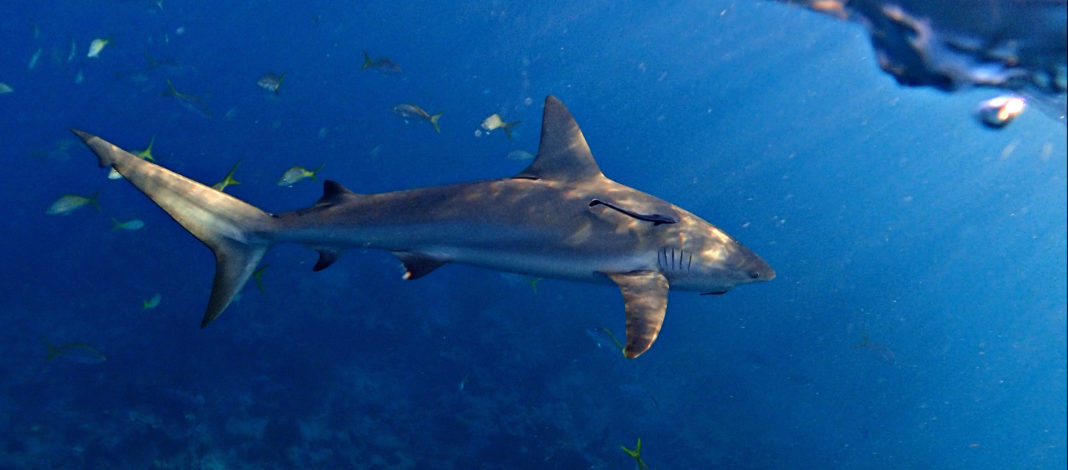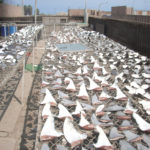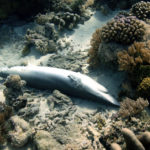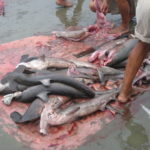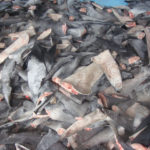SHARK FISHING FACTS:
In the U.S., licensed fishers are permitted to catch certain species of shark, transport the whole animal back to shore and remove the fins there for sale. The definition of “finning” means to remove a shark’s fin at sea and toss the animal back to die. While finning is illegal in the U.S., shark fins can still be sold in the U.S. — something the proposed bill means to end. Since 2015, Miami has led the nation in the number of shark fins imported from Hong Kong, likely caused by an increasing number of import bans in other states. Twelve states currently ban imports. In 2017, Florida passed a bill to increase the penalties of fishermen found guilty of finning.
The ocean has had a profound impact on me for my entire life. Growing up just a few blocks away from the beach in California, I spent much of my free time surfing, skin diving and fishing. It was in this time in my youth that I came to love and appreciate the wonder of the ocean and its inhabitants. As an instructor at Rainbow Reef Dive Center in Key Largo, my very livelihood depends on keeping our oceans healthy and full of fish and other beautiful marine wildlife.
Recently, I had the pleasure to advocate for one of my favorite marine animals on Capitol Hill in Washington, D.C. Sitting before the U.S. House of Representatives Subcommittee on Water, Power and Oceans, I testified in support of the Shark Fin Sales Elimination Act (H.R. 1456) – a bill that would ban the trade of shark fins in the United States. The demand for shark fins, mainly used in shark fin soup, is one of the greatest threats to sharks around the world. The fins from up to 73 million sharks make it into the global market every year. This demand has driven some populations of sharks to ever lower numbers, hurting dive businesses. In Key Largo, sadly, it has become much more rare to sight the Caribbean reef sharks that we used to see more of in the past. As dive professionals, it is hard for us to see shark populations suffer due to the fin trade instead of alive and swimming on our reefs.
We already know that as top predators, sharks play important roles in ocean ecosystems around the world. But many people may not know that sharks play important roles in ocean-based tourism economies, including here in the United States. Multiple scientific studies have shown that shark-watchers spend hundreds of millions of dollars on shark ecotourism every year around the world, and that number is growing.
Last year, an independent economic study found that direct expenditures for shark encounters in the diving industry totaled more than $221 million and fueled more than 3,700 jobs in Florida alone, mine included. I can tell you from firsthand experience that people in Florida love to see sharks. During the peak summer season, we will take up to 1,000 customers out to Key Largo’s reefs each week, and most of those customers want to see the bigger marine creatures like turtles, rays, and, most importantly, sharks. With the reputation of “The Dive Capital of the World,” many guests in Key Largo come with the expectation that the reef life, including sharks, will be in abundance. Unfortunately, we have to let people know that we only occasionally see sharks.
One reason for this is that the dive tourism industry is threatened by the global shark fin trade. This trade also incentivizes the gruesome practice of shark finning, slicing the fin off a shark and dumping the body back into the ocean. While shark finning is illegal in the United States, it still occurs. Last year, Florida Fish and Wildlife officers stopped a Key West shrimp boat that had been illegally finning in U.S. waters – a mere 20 miles north of the island. Additionally, the U.S. allows the import of fins from several countries that have no finning regulations, and once these fins are detached from the body, it is impossible to tell whether it came from a finned shark.
In fact, I have personally seen evidence of this horrible act in U.S. waters. On one of our deep wreck sites in Key Largo last year, we were horrified to find several sharks that were finned and dumped to die in the Florida Keys National Marine Sanctuary. Unfortunately, we arrived likely long after the sharks were finned and dumped. It’s not impossible that the fins from the sharks I saw that day may have ended up in a bowl of soup served here in the U.S.
There is a simple solution to this problem – to end the demand for shark fins in the United States, and to ensure that any fin cannot be sold here – by passing H.R. 1456, the Shark Fin Sales Elimination Act. Already, 12 states have banned the sale and trade of shark fins, joining 40 airlines, 20 major shipping companies, and seven large corporations. Support for this act is overwhelming – 8 in 10 Americans support a fin ban and over 500 U.S. businesses and organizations, including mine, and our local elected official, Congressman Carlos Curbelo.
The world is moving toward ending the shark fin trade, and the United States has an opportunity to be a leader. This opportunity should not be wasted.
ARRESTS:
On June 19, a Coast Guard crew from Station Islamorada found 11 fins on a Tavernier-based commercial fishing boat, the Miss Shell. The boat was stopped for improper navigational lights, but when crew — accompanied by a Fish and Wildlife officer — boarded the boat they also found dismembered sharks and the fins. It is illegal to separate the fins from a shark while at sea. Officers are investigating and charges are pending.
By VANCE KONDON
From 2016 until just recently, Vance Kondon was the dive operations manager at the Rainbow Reef Dive Center in Key Largo, Florida. He recently relocated to the panhandle of Florida, but continues to be active in the movement. Contact him at v.kondon@gmail.com











